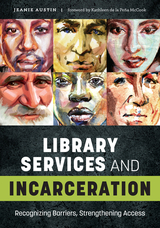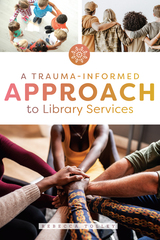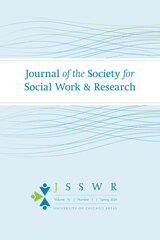
As part of our mission to enhance learning and ensure access to information for all library patrons, our profession needs to come to terms with the consequences of mass incarceration, which have saturated the everyday lives of people in the United States and heavily impacts Black, Indigenous, and people of color; LGBTQ people; and people who are in poverty. Jeanie Austin, a librarian with San Francisco Public Library's Jail and Reentry Services program, helms this important contribution to the discourse, providing tools applicable in a variety of settings. This text covers practical information about services in public and academic libraries, and libraries in juvenile detention centers, jails, and prisons, while contextualizing these services for LIS classrooms and interdisciplinary scholars. It powerfully advocates for rethinking the intersections between librarianship and carceral systems, pointing the way towards different possibilities. This clear-eyed text
- begins with an overview of the convergence of library and information science and carceral systems within the United States, summarizing histories of information access and control such as book banning, and the ongoing work of incarcerated people and community members to gain more access to materials;
- examines the range of carceral institutions and their forms, including juvenile detention, jails, immigration detention centers, adult prisons, and forms of electronic monitoring;
- draws from research into the information practices of incarcerated people as well as individual accounts to examine the importance of information access while incarcerated;
- shares valuable case studies of various library systems that are currently providing both direct and indirect services, including programming, book clubs, library spaces, roving book carts, and remote reference;
- provides guidance on collection development tools and processes;
- discusses methods for providing reentry support through library materials and programming, from customized signage and displays to raising public awareness of the realities of policing and incarceration;
- gives advice on supporting community groups and providing outreach to transitional housing;
- includes tips for building organizational support and getting started, with advice on approaching library management, creating procedures for challenges, ensuring patron privacy, and how to approach partners who are involved with overseeing the functioning of the carceral facility; and
- concludes with a set of next steps, recommended reading, and points of reflection.

We are only now coming to terms with how common trauma really is; a landmark Kaiser study that surveyed patients receiving physicals found that almost two-thirds had experienced at least one form of abuse, neglect, or other trauma as a child. Though originating in the fields of health and social services, trauma-informed care is a framework that holds great promise for application to library work. Empathetic service, positive patron encounters, and a more trusting workplace are only a few of the benefits that this approach offers. In this important book Tolley, experienced in both academic and public libraries, brings these ideas into the library context. Library administrators, directors, and reference and user services staff will all benefit from learning
- the six key principles of trauma-informed care;
- characteristics of a trusting and transparent library organization, plus discussion questions to promote a sense of psychological safety among library workers;
- how certain language and labels can undermine mutuality, with suggested phrases that will help library staff demonstrate neutrality to patron ideas and views during information requests;
- delivery models that empower patrons;
- advice on balancing free speech on campus with students’ need for safety;
- how appropriate furniture arrangement can help people suffering from PTSD feel safe;
- guidance on creating safe zones for LGBTQIA+ children, teens, and adults; and
- self-assessment tools to support change toward trauma-responsive library services.
READERS
Browse our collection.
PUBLISHERS
See BiblioVault's publisher services.
STUDENT SERVICES
Files for college accessibility offices.
UChicago Accessibility Resources
home | accessibility | search | about | contact us
BiblioVault ® 2001 - 2024
The University of Chicago Press









